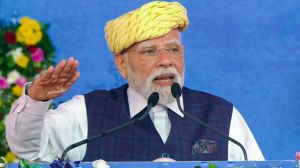On his way out, Mahajan asked for a review of cell licence fee
It was perhaps the parting gift the minister could not give to the cellphone operators. A week before his exit from the government, former T...

It was perhaps the parting gift the minister could not give to the cellphone operators. A week before his exit from the government, former Telecommunications Minister Pramod Mahajan had asked for a review of the licence fees paid by cellular companies.
Documents available with The Indian Express show that Mahajan had asked the Department of Telecom (DoT) to re-examine the definition of revenue on which the licence fee rate is levied.
He issued the instructions following operators’ demand that the licence fee be restricted to the revenue generated from telecom services and not on income from investments, sale of handsets, roaming access charges and bad debts, among others.
Instruction to DoT officials was that the file should be submitted to the minister after review ‘‘keeping in view the demand of the industry.’’
Mahajan says that asking for a review is part of the job of any minister. ‘‘In any ministry, the industry puts a demand and the minister has to ask for the response of the department,’’ he said. Mahajan’s concern for the review was surprising since it was brought up at a meeting to resolve the inter-connectivity wrangle between basic and cellular operators on January 20. Ironically, none of the issues discussed at the meeting was related to the wrangle, show the documents.
Of the other two issues taken up by Mahajan on behalf of the cellular operators, one was related to filling up of all vacant cellular slots in different circles and the second was to set up a panel to examine the operators’ demand for additional spectrum. Mahajan cleared both issues before his departure.
Sources said there was no justification for a review since the revenue definition had been arrived at after deliberation by the Telecom Regulatory Authority of India (TRAI) and approved by the full Telecom Commission, which includes the Finance Secretary.
At the time of the migration from the fixed fee regime to a revenue-sharing one, both sides had agreed that the definition would encompass the total revenue of the licencee firm minus the service tax and charges paid to by the cellular firm to operators like MTNL and BSNL for use of their network.
Mahajan’s stand is that the meeting was not about inter-connectivity alone. ‘‘If everything is so sacrosanct, why did we go for revenue-sharing when the commitment was for fixed licence fee? I just asked for a review, no decision was taken.’’
Sources said that the removal of any of the entries from revenue assessment would lower the income on which the fee rate is applied, thereby reducing the fee quantum paid to the government.
Preliminary estimates show that the demanded revision in the structure would deprive the national exchequer of Rs 1,600 crore for the last three years (since migration on August 1, 1999) and Rs 700 crore each year from next fiscal year.
It would lower monetary accruals in the universal service obligation (USO) fund, which is solely used for upgrading and expanding telephone services in rural India. It was this concern that forced Mahajan to abandon his previous attempt to lower licence fees from 8-12 per cent to 7-8.5 per cent.
Photos



- 01
- 02
- 03
- 04
- 05




























